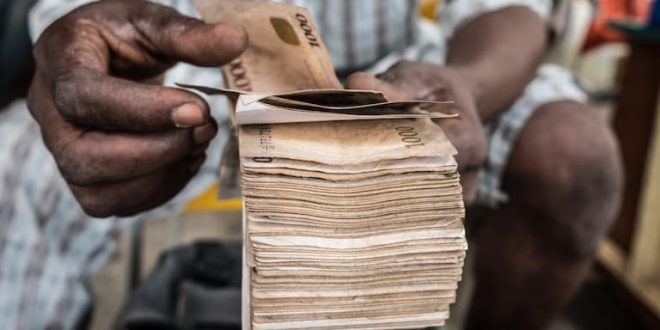In view of the increasing huge chunk of imports from China, the Association of Capital Market Academics of Nigeria (ACMAN) has urged the Central Bank of Nigeria (CBN) to revisit its currency swap deal with the Asian country to a scale that reduces significantly the dependence on the United States dollars for imports from China.
ACMAN, which is the umbrella body of lecturers and researchers in the Nigerian university system and the financial market industry committed to the development of the Nigerian capital market through teaching, research and advocacy, also called for the setting up of a Capital Market Advisory Committee (CMAC) comprising capital market experts in the industry and the academia.
The mandate of such an advisory committee will be to provide research-based advice to the Minister of Finance and Coordinating Minister of the Economy on Public-Private Partnership (PPP) arrangements and various financing opportunities in the capital market.
Briefing journalists in Abuja, Wednesday on the capital market and President Bola Tinubu’s 100 days in office, ACMAN President, Prof. Uche Uwaleke, expressed concern that the forex market has remained illiquid, while volatility in exchange rates has persisted despite the naira float policy which followed the unification of exchange rates.
Uwaleke, who spoke alongside other members of the association, said: “To make matters worse, the parallel premium has continued to widen seemingly defeating one of the objectives of the naira float. In view of the continued huge chunk of imports from China, we are of the view that the CBN should revisit the currency swap arrangement with China to a scale that reduces significantly the dependence on US dollars for imports from China.
“On the supply side, a lasting solution remains embarking on deliberate efforts to diversify the export base. In the meantime, the government should give support to the CBN in the implementation of the RT 200 programme especially in relation to port reforms, while it works on the ease of doing business to pave the way for increased foreign investments.
“We believe that unlocking value in dead assets is one way to improve the country’s fiscal liquidity. We encourage the new administration to speed up the process of privatising government enterprises, including the NNPCL, not by selling to a few individuals or companies but through the capital market for transparency and inclusiveness, as well as explore asset securitisation as a means of financing developmental projects.”
The association commended the Tinubu administration for recognising the capital market as a major pillar in its economic blueprint (as contained in the president’s Policy Advisory).
“In this regard, we recommend the setting up of a Capital Market Advisory Committee (CMAC) comprising capital market experts in the industry and the academia whose mandate will be to provide research-based advice to the Hon. Minister of Finance on PPP arrangements and various financing opportunities in the capital market.
“In conclusion, ACMAN notes with concern a recent memo by FTSE Russell, in which the subsidiary of the London Stock Exchange (LSE) disclosed its reclassification of the Nigerian stock market index from Frontier to Unclassified market status citing difficulty by international institutional investors to repatriate capital from Nigeria.
“We think this is a premature move on the part of FTSE Russell, which has not allowed sufficient time for the forex reforms introduced by the government to mature,” ACMAN said.
The association noted that over the recent years, the Nigerian economy has been characterised by weak growth, high inflation, unemployment and volatile exchange rates, rising public debt and fiscal imbalance compounded by CBN’s Ways and Means and a corrupt fuel subsidy regime.
“These legacy challenges confronted the president on assumption of office. Against this backdrop, the twin policies designed to end fuel subsidy and unify multiple exchange rates, which defined the administration’s first 100 days in office, were largely welcomed by both domestic and foreign investors and seemed to boost confidence in the economy.
“Perhaps no where has this confidence manifested better than the stock market where the benchmark index (NGX ASI) hit the highest level ever in the history of the Nigerian stock market (over 68,000 points) with year-to-date return now above 30 per cent.
“But these reforms have left in their wake unpalatable outcomes which have made life more difficult especially for the ordinary Nigerian. Inflation rate is on the rise with food prices largely unaffordable.
“There is evidence of declining economic activities with fewer vehicles on the roads and reduced work days in both private and public sectors. Similarly, not a few micro and small businesses have reduced their scale of operations due largely to inability to afford the high cost of fuel.
“The president is advised to move speedily to ameliorate the pains brought on vulnerable Nigerians on account of the sudden removal of fuel subsidy. This should include scaling up the interventions in MSMEs and agriculture as the current size of the total package is very small, at less than N1 trillion,” it added.
(This Day)
 National Telescope national telescope newspaper
National Telescope national telescope newspaper



